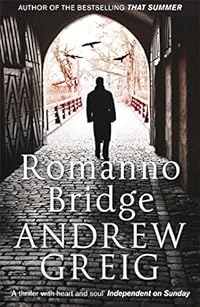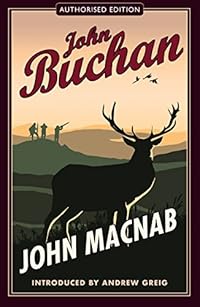Romanno Bridge by Andrew Greig
Posted in Andrew Greig, Reading Reviewed, Scottish Fiction, Scottish Literature at 12:00 on 2 February 2019
Quercus, 2008, 316 p

Set in the mid 1990s – someone “says there’s going to be an election soon and things can only get better” – this novel reunites the reader with all the main characters from Greig’s earlier book The Return of John Macnab and throws in two more here for good measure in the shape of Maori rugby player Leo Ngatara and Norwegian musician Inga Johanssen.
The plot has more of a thriller touch this time, centring round the genuineness or otherwise of the Stone of Destiny. In her job as a journalist in Dumfries Kirsty Fowler meets Billy Mackay, an old man in his last days, who tells of his participation in the making of two replacement stones during the time the “original” was missing in 1950. This leads to designations such as fake fake as opposed to the real fake foisted on England’s Edward I and kept at Westminster ever since (until recently at least.) It is the whereabouts of Columba’s Pillow, the real crowning stone, hidden from Edward at the time and kept in the care of Moon Runners – whose guardianship is embodied in rings inscribed with runes (Moon rune-ers, you see, with only ever three extant at one time) – ever since that drives the plot. Mackay gifts Kirsty one such ring and thus unwittingly places her in danger at the hands of a ruthless intermediary calling himself Adamson who came to know of their existence via Inga’s brother Colin – and has a buyer for the real stone. The goings-on in uncovering the hiding places of the two fake fake stones and the original fake itself, take the characters to various parts of Scotland and even on an excursion to Norway.
All this gives Greig an opportunity to display his familiarity with the art of rock climbing and the music scene and to comment about Scots’ habit of revering their homeland, “‘Ye’d hae thought Scotland was Helen of Troy the way some folk sighed over her,’” even as seen through the eyes of foreigner Inga, “Strange place to inspire such belonging.” There are wider ruminations too. We are told an ancient Sumerian manuscript bemoans the times as violent, chaotic and strange, the young don’t speak properly, the gods are unrespected, etc, etc. – which only means the writer was elderly. And Leo Ngatara comes to reflect bleakly that, “None of us will be all right. Mountains, sunsets, good times, bad times, mates, children – nothing endures. Nothing. No exceptions.”
Greig is never less than an insightful novelist but here the thriller plot sits a little uneasily with his gifts for illuminating character, describing landscape and revealing the complexities of human affairs.
Pedant’s corner:- a missing comma before a piece of direct speech, “The last thing he saw were the three stones” (The last thing he saw was… ,) Burns’ (Burns’s,) “George V was dying” (George VI,) bonzer (is that NZ speak or only Aussie? Only Aussie if you check this though it seems “rack off” and strewth are used in NZ,) midgies (midges,) medieval (we had had mediaeval before,) “‘Hey Johnny Cope are ye wakin’ yet?’” (more usually ‘Hey Johnnie Cope are ye waukin’ yet’,) reorted (retorted,) “the passage way” (passageway,) bonzer Scone? (bonzer stone makes more sense,) rowboat (rowing boat,) “only the remnant” (the only remnant makes more sense,) the Irish bazouki, bazouki, (both bouzouki,) Merkdal (was Myrdal earlier,) snuck in (sneaked in.) “The crowd were spellbound.” (The crowd was spellbound.) “‘Yes, but we didn’t know that.’” (Yes, but he didn’t know that,) Dundas’ (Dundas’s,) Taynult (Taynuilt, spelled correctly a few pages later,) maw (it’s a stomach, not a mouth,) Firth of Lorn (more usually Lorne,) iron grill (grille.)

